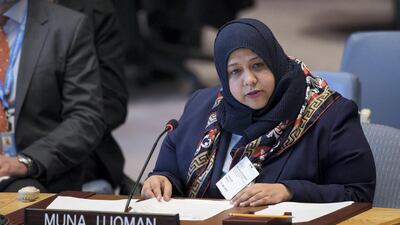Yemeni women are demanding equal representation in a United Nations-led peace process aimed at ending the country’s devastating four-year war.
The UN's special envoy to Yemen Martin Griffiths helped broker a deal between Yemen’s internationally recognised government and Houthi rebels in Sweden last December that agreed to a ceasefire in the port city of Hodeidah and a prisoner exchange.
But the agreement is yet to be implemented, the government says because of rebel violations. Yemeni women say it failed to include their perspective.
The parties included in the process “must consult regularly with women, and to ensure women’s meaningful inclusion," Muna Luqman told the UN Security Council this week. Ms Luqman is the co-founder of the Women Solidarity Network that is assisting Mr Griffiths' group of women advisers.
The women advising the UN envoy have set a number of objectives aimed at ending the fighting, building peace, improving living conditions and amplifying women’s voices and participation in negotiations and peace-building.
But they feel that their voices need to be further enhanced and included in the heart of negotiations.
“There is no excuse any more for continuing to exclude women except a poorly designed peace process,” she told the Security Council.
Ms Luqman, known as one of Yemen’s leading peace activists, became the third Yemeni woman to brief the council this week.
“We are frustrated because women’s role in peace building continues to be ridiculed, and women who are the real peace makers, continue to be excluded in the ceasefire and peace process,” she said.
Despite the success of the Stockholm Agreement in bringing the two sides together, it failed to include a substantial number of women delegates.
“It excluded women and also led to a gender blind agreement,” Ms Luqman said.
There is only one woman on the negotiating table: Rana Ghanem – a member of the government delegation.
Her participation has placed intense pressure on her to represent all of aspects of Yemen’s female population.
"As the only woman among the delegates, I feel that I have to carry a lot of responsibilities, including the status and situation of women," Ms Ghanem told The National during the last round of talks in Sweden.
Yemeni women have been leading efforts to bring peace to Yemen and hold communities together with limited resources, Ms Luqman said, adding that talks have been set up with Houthi women.
“They [Houthi women] expressed their readiness to participate in peace negotiations. And it is not impossible to include them.”
She went on to say that she is a survivor of the war in Yemen, explaining that her home in Taiz has been destroyed.
Ms Luqman mediated the evacuation of children from an orphanage stormed by Houthis seeking to position snipers in Taiz.
“Escaping death in Yemen is increasingly becoming difficult,” she said, noting that four months after the signing of the Stockholm Agreement, armed clashes continue in Hodeidah, more families are being displaced and people are deprived of food, medicine, fuel and electricity.
For his part, Mr Griffiths expressed gratitude for Ms Luqman’s efforts and called for a greater woman’s participation in the talks.
“There is no doubt we can all do a lot better when it comes to the inclusion of women and other sectors of civil society indeed in the political process,” Mr Griffiths said.
The UN envoy said Ms Muna encourages “us to do better in our efforts to include women, both in the formal delegations that come to rounds of formal consultations, but also in those much more extensive consultations that will help refine the issues we put before the parties.”
Hooria Mashhour, a former Yemeni human rights minister who advised a group of women who assisted Mr Griffiths, praised the UN’s efforts to include women but argued that more needs to be done.
"We want to see many women involved in all peace process mechanisms including consultation, dialogues, negotiations and in the post war phase," Ms Mashhour told The National. "In this phase we are much looking forward for applying a transitional justice approach."


